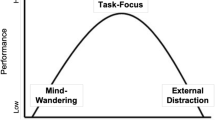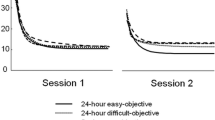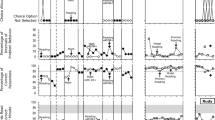Abstract
Johnston and Lethem (1981) have hypothesized that when subjects attempt to decrease their interbeat interval (i.e., increase their heart rate) maximally, then interbeat interval feedback has a purely motivational role, but when they attempt to decrease their interbeat interval by a precise amount, such feedback has a primarily informational role. This was tested by comparing the performance of 16 subjects on both types of task. It was predicted that additional monetary incentives would reduce the difference between feedback and no-feedback conditions when subjects were attempting to reduce interbeat interval maximally but not when attempting to reduce it by a specific amount. This prediction was not supported. Incentive was found to aid performance on the maximal interbeat interval decrease task, but this was independent of the effects of feedback. Only feedback effects were detected on the specific interbeat interval decrease task.
Similar content being viewed by others
References
Bilodeau, E. A. Supplementary feedback and instructions. In E. A. Bilodeau & I. McD. Bilodeau (Eds.),Principles of skill acquisition. New York: Academic Press, 1969. Pp. 235–253.
Fleishman, E. A. Human abilities and the acquisition of skill. In E. A. Bilodeau (Ed.),Acquisition of skill. New York: Academic Press, 1966. Pp. 147–167.
Johnston, D. W. Biofeedback, verbal instructions and the motor skills analogy. In J. Beatty & H. Legewie (Eds.),Biofeedback and behavior. New York: Plenum Press, 1977. Pp. 331–341.
Johnston, D. W., & Lethem, J. The production of specific decreases in interbeat interval and the motor skills analogy.Psychophysiology 1981,18 288–300.
Schwartz, G. E., Young, L. P., & Volger, J. Heart rate regulation as skill learning: Strength-endurance versus cardiac reaction time.Psychophysiology 1976,13 472–478.
Williamson, D. A., & Blanchard, E. B. Heart rate and blood pressure feedback. II. A review and integration of recent theoretical models.Biofeedback and Self-Regulation 1979,4 35–50.
Author information
Authors and Affiliations
Additional information
We would like to thank Dr. J. Teasdale for his helpful comments on an earlier version of this paper. This research was supported by the British Medical Research Council
Rights and permissions
About this article
Cite this article
Johnston, D.W., Lethem, J. Feedback and incentive effects on the decrease of interbeat interval. Biofeedback and Self-Regulation 8, 255–263 (1983). https://doi.org/10.1007/BF00998855
Issue Date:
DOI: https://doi.org/10.1007/BF00998855




